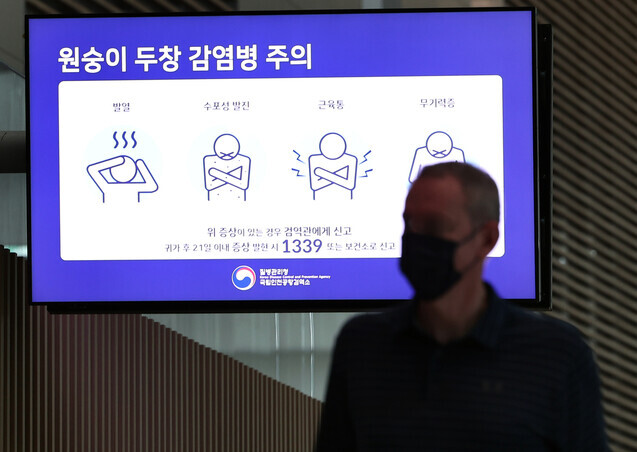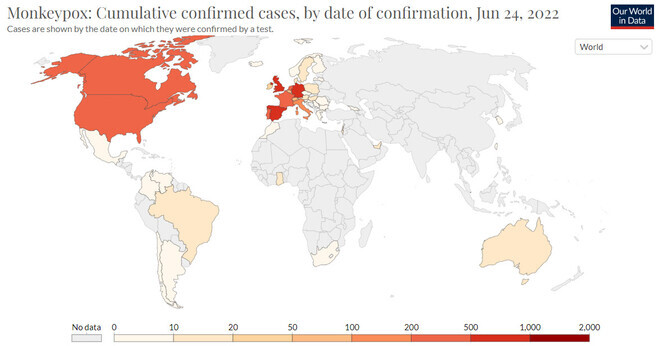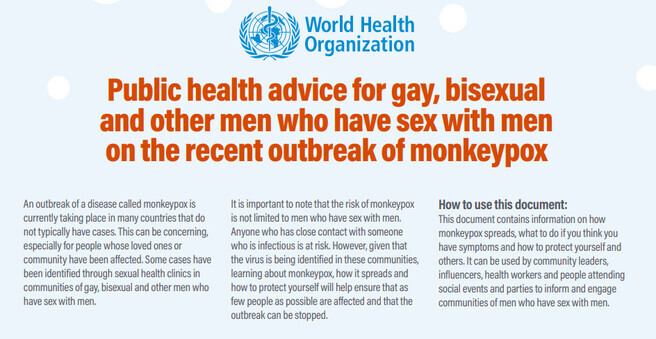hankyoreh
Links to other country sites 다른 나라 사이트 링크
COVID-19 lessons for monkeypox: Stigma hinders disease control
Wrongfully painting sexual minority men as the source of monkeypox infections may discourage individuals with suspected infections from seeking early diagnosis and treatment

Monkeypox has made its way to South Korea, prompting the prevention of community spread to surface as an urgent policy task in the country. Meanwhile, observers are pointing out that now is the time to reflect on a core lesson from the COVID-19 pandemic: Stigmatizing positive cases hinders disease prevention efforts. This is because wrongfully painting sexual minority men as the source of monkeypox infections may discourage individuals with suspected infections from seeking early diagnosis and treatment, which may have enormous repercussions for disease prevention as a whole.
As of Sunday, the Korea Disease Control and Prevention Agency (KDCA) has confirmed only one positive case of monkeypox within South Korea, which occurred in a Korean national who entered the country from Germany on June 21. But with disease control measures related to COVID-19 being relaxed for individuals arriving in South Korea from abroad, community spread of monkeypox is becoming more and more likely.
Because of its low transmissibility, monkeypox is not likely to cause a full-blown pandemic like the COVID-19 virus. However, because monkeypox has an incubation period of up to 21 days, the virus may continue to spread in silence. Especially considering that the virus doesn’t entail easily noticeable symptoms like a fever and that it causes rashes on body parts that are not easy to check on one’s own, it’s imperative that individuals who suspect they have caught the virus voluntarily report symptoms to proper authorities and get tested in order to prevent the virus’ further spread.

First detected in the UK and now surfacing across Europe and the US, recent cases of monkeypox have entailed symptoms that are somewhat different from monkeypox in its endemic form. Although the virus has been known to first cause fever and then the development of rashes on the face, hands and feet, recent cases have sometimes not been accompanied by preliminary symptoms like a fever, with rashes appearing on the genitals and other body parts that are difficult for others to observe.
Moreover, while monkeypox was known to spread through contact with infected animals, individuals, and objects contaminated with the virus, recent cases have mainly spread through human-to-human contact, leading to community spread.
Users of certain online communities in South Korea are claiming that many people who have tested positive for monkeypox are sexual minority men, causing an outburst of hate speech against such minorities. This is because a vast majority of individuals who have tested positive for the virus so far are men, and discourse about early outbreaks emphasized that the virus had spread through a very specific avenue: sex between men.
However, the World Health Organization stated in its guidance last month that “the risk of monkeypox is not limited to men who have sex with men” and that “anyone who has close contact with someone who is infectious is at risk.” Domestic experts also say there is no evidence yet that monkeypox spreads among humans through sexual contact, and that it’s entirely possible that the virus spread within male sexual minority communities by coincidence.
“The extent to which sexual contact heightens the risk [of infection] is something that needs to be shown through epidemiological investigations,” said Choi Won-suk, a professor of infectious disease at Korea University Ansan Hospital. “Sexual contact is in itself close contact, so the risk of infection shouldn’t be different among men or women.”

What’s evident currently is that the monkeypox virus is spreading among humans and that proactive participation in disease control measures by immediately reporting suspected infections to disease control authorities, early diagnosis, and treatment are needed to prevent the virus from spreading further. As a matter of fact, the first individual to test positive in South Korea as well as individuals with suspected infections in the country all self-reported their cases, which led to subsequent testing.
Even more, South Korea learned the important lesson that social stigmas hinder infectious disease prevention when a club in Itaewon became the site of a COVID-19 outbreak in May 2020. At the time, a specific club in Itaewon was highlighted as a “gay club,” causing individuals who tested positive in connection with the outbreak to be targeted for their sexual orientation, a factor that had no relevance to disease control. Patrons of the club who feared being stigmatized as “sexual minorities” shunned early testing and investigations, negatively affecting disease control efforts.
Jang Young-ook, a researcher at the Korea Institute for International Economic Policy, commented, “Prevention is the most important aspect of [responding to] diseases, and linking diseases with specific identities will cause a great deal of hidden infections and hidden spread to take place.”
As such, disease control authorities are being vigilant about unnecessarily releasing personal information. During a Wednesday briefing about South Korea’s first monkeypox case, the KDCA stated that “the sex and age of the patient who tested positive are not subject to public release.”
Peck Kyong-ran, the commissioner of the KDCA, also emphasized during a meeting on June 9 that she will “meticulously overhaul [the KDCA] so that [those who test positive] don’t have to worry about their information being leaked.”
By Jang Hyeon-eun, staff reporter; Lim Jae-hee, staff reporter
Please direct questions or comments to [english@hani.co.kr]

Editorial・opinion
![[Correspondent’s column] The real reason the US is worried about Chinese ‘overcapacity’ [Correspondent’s column] The real reason the US is worried about Chinese ‘overcapacity’](https://flexible.img.hani.co.kr/flexible/normal/500/300/imgdb/original/2024/0510/5217153290112576.jpg) [Correspondent’s column] The real reason the US is worried about Chinese ‘overcapacity’
[Correspondent’s column] The real reason the US is worried about Chinese ‘overcapacity’![[Editorial] Yoon’s gesture at communication only highlights his reluctance to change [Editorial] Yoon’s gesture at communication only highlights his reluctance to change](https://flexible.img.hani.co.kr/flexible/normal/500/300/imgdb/original/2024/0510/7717153284590168.jpg) [Editorial] Yoon’s gesture at communication only highlights his reluctance to change
[Editorial] Yoon’s gesture at communication only highlights his reluctance to change- [Editorial] Perilous stakes of Trump’s rhetoric around US troop pullout from Korea
- [Guest essay] Preventing Korean Peninsula from becoming front line of new cold war
- [Column] The state is back — but is it in business?
- [Column] Life on our Trisolaris
- [Editorial] Penalties for airing allegations against Korea’s first lady endanger free press
- [Editorial] Yoon must halt procurement of SM-3 interceptor missiles
- [Guest essay] Maybe Korea’s rapid population decline is an opportunity, not a crisis
- [Column] Can Yoon steer diplomacy with Russia, China back on track?
Most viewed articles
- 1[Correspondent’s column] The real reason the US is worried about Chinese ‘overcapacity’
- 2S. Korea “monitoring developments” after report of secret Chinese police station in Seoul
- 3Nuclear South Korea? The hidden implication of hints at US troop withdrawal
- 4[Editorial] Yoon’s gesture at communication only highlights his reluctance to change
- 5Yoon voices ‘trust’ in Japanese counterpart, says alliance with US won’t change
- 6No good, very bad game for Korea puts it out of Olympics for first time since 1988
- 7Presidential office warns of veto in response to opposition passing special counsel probe act
- 8Smartphones have been shown to hurt brain development — can Korean kids kick the habit?
- 9‘We must say no’: Seoul defense chief on Korean, USFK involvement in hypothetical Taiwan crisis
- 10Korea poised to overtake Taiwan as world’s No. 2 chip producer by 2032